
|
![]()
Greatest Films of the 1950s
1950 | 1951 | 1952 | 1953 | 1954 | 1955 | 1956 | 1957 | 1958 | 1959
Title Screen Film Genre(s), Title, Year, (Country), Length, Director, Description 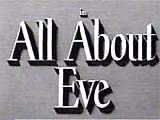


All About Eve (1950), 138 minutes, D: Joseph L. Mankiewicz
Best Director-winning Joseph L. Mankiewicz's much-loved, lengthy, acerbic drama of backstage New York theatre life was a very literate Best Picture-winning film, and also an Oscar-winner for Mankiewicz's own Best Screenplay. Wit and sarcasm reigned supreme (e.g., "Fasten your seat belts. It's going to be a bumpy night"), and Marilyn Monroe also appeared in a bit cameo role as aspiring actress Miss Caswell. As the film opened during an awards ceremony, a rising, unscrupulous star known as Eve Harrington (Oscar-nominated Anne Baxter) accepted the Sarah Siddons award for Best Actress of the year on the Broadway scene. In flashback, it was then revealed how the shameless young starlet had insinuated herself into the life of her idol, Margo Channing (Oscar-nominated Bette Davis) - an aging, bitchy accomplished Broadway stage star. Margo befriended and took the seemingly-naive, shy, helpless and innocent fan Eve under her wing as her confidential assistant/secretary, but soon after, the duplicitous Eve schemed to steal her theatrical roles and her fiancee-lover Bill Sampson (Gary Merrill). By ruthlessly exploiting the older woman's kindness and hospitality, Eve managed to achieve her present success while almost destroying the veteran star in the process. On the sidelines but also in the same company as Eve was the film's acid-tongued narrator Addison De Witt (Oscar-winning George Sanders) - a cynical, egotistical columnist/critic. As Eve's conniving ways were revealed, she became Margo's understudy, and then orchestrated Margo's absence by stranding her out of town, so that she could take her place and receive accolades from NY theatre critics. She even enlisted the aid of Karen Richards (Oscar-nominated Celeste Holm), the wife of the playwright Lloyd Richards (Hugh Marlowe), and was able to aggressively manipulate him away from Karen to provide her with a new play. Meanwhile, Addison De Witt saw through Eve's calculating nature and ultimately called her out on the day of her debut performance for her manufactured past, and her opportunistic ambitions. The ending of the film returned to the awards banquet to find the starlet clinging to her trophy. Ironically, she would soon be replaced by another younger fan in the wings - an aspiring protege named Phoebe (Barbara Bates) that resembled Eve who would undoubtedly take her place in the near future.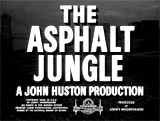


The Asphalt Jungle (1950), 112 minutes, D: John Huston
Director John Huston's classic noirish thriller was an adaptation based on a novel by W. R. Burnett. It told about legendary mastermind, aging, ex-convict criminal Erwin "Doc" Riedenschneider (Sam Jaffe), who came out of retirement (prison after a seven-year stint) for one last jewel robbery with an assemblage of underworld characters - he meticulously explained his proposed heist to steal jewels worth more than $500,000. The film realistically depicted all the semi-professional criminals and their motivations in the crime - the three, two-bit hired crooks: "box man" (safecracker) Louie Ciavelli (Anthony Caruso), a getaway driver - hunchbacked diner owner Gus Minissi (James Whitmore), and a tough, strong-armed "hooligan" drifter named Dix Handley (Sterling Hayden) from a Kentucky horse-farm, with his sympathetic girlfriend Doll Conovan (Jean Hagen). Corrupt and sleazy lawyer and financier Alonzo Emmerich (Louis Calhern) would fence the stolen goods to support his expensive habits (e.g., an affair with seductive mistress). He maintained a blonde, voluptuous mistress Angela Phinlay (Marilyn Monroe in a minor but memorable cameo role) - to his distaste, she called him "Uncle Lon" and he called her "some sweet kid." The actual jewel robbery was clinically-delineated with details of the tense heist (the hammering through a brick wall, the nitro bottle with home-made "soup", the alarm system, etc.). The successful heist unraveled quickly and everything fell apart when an alarm accidentally sounded and the safecracker was mortally wounded by an armed guard's stray bullet. A double-cross was also planned by "the big fixer" Emmerich who planned to steal the jewels and escape to Europe. He had hired his own armed shady private detective Bob Brannom (Brad Dexter). Emmerich double-crossed both Dix and "Doc" when he delayed payment for the jewels and suggested taking possession of the jewels from "Doc" - at gunpoint. Dix saw the proposed sabotage of the fencing operation and shot Brannom, but was also mortally wounded. Afterwards, Emmerich revealed his corruption to his wife May (Dorothy Tree), who feared his many associations with "awful people...downright criminals" - he replied to her: "Oh, there's nothing's so different about them. After all, crime is only a left-handed form of human endeavor." Emmerich's alibi (through Angela) was revealed to be a lie. When threatened with arrest by the police, Emmerich retreated to a side room to write an apology-suicide note to his wife May, but then he tore up the note into pieces, reached for a gun in the desk drawer, and committed suicide (the gun-shot was heard off-screen). During his escape Doc was apprehended by police after he stopped at a roadside diner during his getaway. He was doomed when he obsessively (and voyeuristically) leered at a young girl named Jeannie (Helene Stanley), then gave her a bunch of coins to put in the jukebox ("Play me a tune") and watched her dance to the music - his delayed departure (he believed he had "plenty of time") led to his arrest - two policemen watched him from outside through venetian blinds. In the film's final press conference, Police Commissioner Hardy (John McIntire) delivered a moralizing speech to reporters about rampant crime. In the final scene, a bleeding and dying Dix Handley (who had fled) stumbled from his car into Hickory Wood Farm (his father's Kentucky horse farm lost during the Depression, and his own childhood home) - he staggered, collapsed and expired in a sunny horse pasture amidst four grazing and nuzzling colts he had dreamed of owning.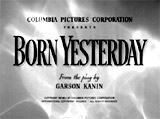

Born Yesterday (1950), 103 minutes, D: George Cukor
Director George Cukor's comedy was one of the greatest of all-time, based upon Garson Kanin's 1946 play, and remade as Born Yesterday (1993) with Melanie Griffith, John Goodman, and Don Johnson. In the opening sequence, all three of the major characters were introduced during an elaborate arrival scene at Washington DC's Hotel Statler: corrupt, disreputable and uncouth, ignorant, and crooked millionaire junkyard (scrap-iron) tycoon Harry Brock (Broderick Crawford), his unrefined, expensively-dressed (with multiple fur coats) "dumb blonde" ex-chorus girl mistress/fiancee (a 'kept woman' for seven years) from Brooklyn named Emma "Billie" Dawn (Judy Holliday, a Best Actress Oscar winner in a major upset), and influential, DC political journalist Paul Verrall (William Holden). Brock and his mistress were escorted to an upper-floor, reserved "entire wing" of three expensive suites of rooms. In consultation with his Washington lawyer Jim Devery (Howard St. John), Brock was seriously contemplating setting up an educational tutor to refine Billie's harsh social graces, so that he wouldn't be embarrassed by her behavior in front of congressmen and other influential people. Brock hired Paul Verrall as Billie's tutor for $200/week - to refine Billie and make her more socially respectable and happy: ("Show her the ropes, sorta, and kinda explain things to her"), while he was working bribes and trying to influence politicians. Paul was particularly interested in trying to expose Brock's nefarious business dealings while working with Billie. As part of her tutoring sessions, Paul gave Billie civic-lessons field trip/tours around Washington DC's monuments and public buildings. (It was revealed during the story that Brock had unethically been using the unwitting Billie as an accomplice for his many business maneuverings and illegalities by having his empire of junkyards registered in her name - so he wouldn't be held responsible if prosecuted.) A burgeoning romance developed between Billie and bachelor Paul, after he kissed her in an elevator. Over time, Billie began to develop social consciousness and a true understanding of democracy, as well as an understanding of Brock's corruption, greed, power and personal arrogance. In the climactic scene, the newly-independent, free-thinking Billie realized that she needed to escape from Brock forever, when he was becoming more aggressively abusive, and still calling her 'dumb.' She called him a "Big Fascist!", and retorted: "Would you do me a favor, Harry?...Drop dead!" Finally, she stood up to Brock, and laid down an ultimatum: ("When you steal from the government, you steal from yourself, ya dumb ox!"). She affirmed that she would no longer sign any of his business papers in his scheme to form a scrap-iron cartel, and threatened to leave him. She would slowly relinquish his 126 different properties back to him that she legally owned (he had signed them over to her to hide them from the government), but only one by one: "In this whole thing, I guess you forgot about me - about how I'm a partner....So here's how it's gonna be. I don't want 'em. I don't want anything of yours or to do with you, so I'm gonna sign 'em over ...only not all at once. Just one at a time. One a year. Only you gotta behave! 'Cause if you don't, I could let go on everything! For what you've done, even since I've known you, I bet you could be put in jail for about 900 years. You'd be a pretty old man when you got out." Meanwhile, the two lovers Paul and Billie were married. The film's final lines were spoken to a motorcycle cop who asked for their license, but he was given their recent marriage license. He chuckled: "License please. No, not this license" - but then quickly forgave their crime: "Okay, forget it. My wedding present. But take it easy, or you'll never make it." Billie spoke about her recent marriage to Paul: "Oh, don't worry, we'll make it. It's a clear case of predestination." Officer: "Pre--- what?" Billie: "Look it up!"

Cinderella (1950), 76 minutes, D: Disney Studio (Clyde Geronimi, Wilfred Jackson, Hamilton Luske)
Disney's superbly-animated, mid-century, musical fantasy masterpiece (based on the 1697 fairy tale classic by Charles Perrault) was the first of Disney's feature animations to be turned into a live-action cinematic effort (in 2015). It began with a hard-bound storybook phrase: "Once upon a time, in a far-away land," brought to life by the Narrator (Betty Lou Gerson). The kind-hearted, hard-working Cinderella (voice of Ilene Woods) was introduced with her cruel, widowed stepmother Lady Tremaine (voice of Eleanor Audley) and two nasty, selfish, vain and ugly step-sisters, the older Drizella (voice of Rhoda Williams) and younger Anastasia (voice of Lucille Bliss), who treated her like a scullery maid and ordered her to do laundry and clean the house. Her only friends were farm animals (benevolent mice and chirping birds). In his castle, the King (voice of Luis Van Rooten), interested in grandchildren via the marriage of his son The Prince (voice of William Phipps), ordered the Grand Duke (voice of Luis Van Rooten) to invite every eligible maiden in the kingdom to a Royal Ball. After the Royal Ball was announced, Cinderella - with the help of her animal friends, including Jaq and mouse Gus (voice of James MacDonald) (who were often chased by Lucifer, Lady Tremaine's cat) and flying bluebirds, created a pink ball gown from scraps of discarded fabric - but then after it was destroyed by her stepsisters and was left in tattered rags, the Fairy Godmother (voice of Verna Felton) appeared and magically transformed the dress into a beautiful, sparkling white ball gown ("Why, it's like a dream!"), accompanied by two glass slippers. The Fairy Godmother also cautioned Cinderella to return by midnight before the spell would end. The magical wand of the fairy Godmother also performed other transformations: a pumpkin into a carriage, four mice into horses, the bloodhound dog Bruno into a footman and old horse Major into a coach-man driver, accompanied by the Fairy Godmother's singing of the Oscar-nominated song, "Bibbidy-Bobbidi-Boo" (aka The Magic Song) with nonsensical lyrics. During the Royal Ball, Cinderella waltz-danced with the smitten Prince Charming (singing voice of Mike Douglas) and they sang: "So This Is Love"; as midnight approached, Cinderella ran off, leaving one of her slippers behind on the staircase. She barely escaped before the coach turned back into a pumpkin. The Prince was determined to find the rightful owner of the slipper, and visited each home to try on the slipper. Cinderella's chances of trying it on were sabotaged when her stepmother locked her in the attic of the stone tower. In a comical scene when the Grand Duke visited Cinderella's chateau, the obnoxious step-sisters vainly attempted to squeeze their oversized feet into the glass slipper; once Cinderella had been freed by her animal friends who cleverly stole the key and transported it upstairs to unlock the attic door, Lady Tremaine tripped the page to deliberately smash the slipper. However, Cinderella outwitted them when she produced the second slipper (that she had worn to the ball) that fit perfectly on her foot. In the "they lived happily ever after" ending after wedding the Prince - Cinderella rode off in a gold carriage with her new husband.



D. O. A. (1950), 83 minutes, D: Rudolph Mate
Rudolph Maté's nihilistic, classic film noir detective story (also noted as 1949) was remade as Color Me Dead (1969, Australia) and as D.O.A. (1988), starring Dennis Quaid and Meg Ryan in a completely-revised story). In the famous unexpected opening, 33 year-old income tax accountant/notary public Frank Bigelow (Edmond O'Brien) from Banning, CA, filmed from behind, entered the Homicide Division of a Los Angeles police station to report a murder: ("I want to report a murder") - he was speaking almost from beyond the grave; the doomed Bigelow gave a classic reply when asked who was murdered by the Police Captain (Roy Engel) - he said: "I was"; to Frank's surprise, the Captain had already been alerted about Bigelow with an APB (All-Points Bulletin Missing Persons Report) from Inspector Bannet in the Homicide Division in San Francisco. The film reverted to a lengthy flashback beginning two days earlier - Bigelow was working as an accountant and notary public in his hometown office of Banning, CA, with his blonde secretary-girlfriend Paula Gibson (Pamela Britton) - she was interested in a serious relationship with him, although he kept putting her off. Bigelow arrived for a one-week vacation at the St. Francis Hotel in San Francisco, where after a night of carousing in a jazz or "jive" night-club ("The Fisherman") on the Embarcadero, he complained of a "bellyache." The diagnosis was that he had been fatally poisoned via radiation by iridium (with a lethal dose of a glow-in-the-dark "luminous toxin"), when he didn't notice that his drink in The Fisherman had been swapped and doctored. Bigelow was told that he was already "dead" and that he had maybe a day or a week or two to live. Bigelow was notified about an urgent phone call that had been received (during his first two days' absence) from owner Eugene Phillips of the Los Angeles-based Phillips Importing and Exporting Company. Soon after the attempted contact with Bigelow, Phillips had suspiciously committed suicide - apparently by leaping off the balcony of his high-rise, six-story apartment. Two days earlier, Phillips seemed to have been in "a pretty bad jam" and faced prison - he had been arrested (but then released on bail) for selling a shipment of stolen iridium (a costly rare metal), even though the very-innocent Phillips claimed it was a false allegation. He didn't know that he had been framed and the deal was actually made six months earlier in Palm Springs, CA by company associate George Reynolds (an alias for Raymond Rakubian) to his uncle-dealer - a gangster named Majak (Luther Adler). Reynolds had since disappeared. If the original bill of sale surfaced, it would show that Reynolds was the dealer-seller and would face a long and stiff prison term, not Phillips. The critical bill of sale could prove that the authorized transaction (with a bill of sale) was not made by Phillips at all - and was not the motive for his 'suicide.' However, it appeared that Reynolds (or someone else, revealed later!) had stolen or destroyed the bill of sale, and people involved were being eliminated, to erase all evidence of the sale. Bigelow was involved in the case - because 6 months earlier, he had notarized the bill of sale of iridium from company associate Reynolds to Phillips. Thus, he was poisoned as part of a cover-up conspiracy. Bigelow learned that George Reynolds had been dead for the past five months, and now that Bigelow was tangentially connected with Majak's nefarious dealings, he had to be eliminated (via poison). The film's bombshell revelation was that Mr. Halliday (William Ching), the main financial officer/comptroller of the Import/Export company owned by Phillips, and Eugene's wife Mrs. Phillips (Lynn Baggett) had been involved in a two year affair. During dinner with Halliday, Mrs. Phillips and her brother-in-law Stanley (Henry Hart), Eugene's younger brother, the latter confronted them with an incriminating letter about Halliday's affair with Mrs. Phillips, but then turned up poisoned (with only a few days to live). Soon after Eugene had found out about his wife's illicit affair, he had been pushed off the balcony to his death by Halliday. The theft of the iridium by Majak was created as a diversion to cover up their act of murder by Halliday. Widowed Mrs. Phillips and her conspiratorial secret lover Halliday faced a possible murder conviction of plotting to kill Eugene. In order to cover-up the murder and divert attention, all evidence of the sale of iridium six months earlier for Phillips' business was being systematically eliminated by the two of them, to draw attention there. Mrs. Phillips admitted to stealing the bill of sale herself, and claimed that anyone else who was involved with or could prove that there was a bill of sale for the illegal substance was to be eliminated. Mrs. Phillips confessed everything to Bigelow about why he had been targeted with the poison (administered by Halliday in SF) - because he had inadvertently become involved. As he left his downtown LA office, Bigelow was shot at multiple times on the stairway but unharmed - during a crazed, gun-blasting face-off with slick but ruthless murderer Mr. Halliday. Bigelow shot him dead. Bigelow returned to the police station, and the film's lengthy flashback ended, where he finished describing how he had just solved his own murder case: ("All I did was notarize a bill of sale. But that piece of paper could have proven that Phillips didn't commit suicide. He was murdered. And that's why Halliday poisoned me") - Bigelow summarized that he was killed because he innocently notarized a bill of sale for the stolen iridium. After Bigelow fell dead to the floor and the Deputy asked, in an equally famous closing exchange: "How shall I make out the report on him, Captain?"; the Captain responded: "Better make it 'Dead on Arrival'." In a close-up, Bigelow's Missing Persons report from San Francisco was stamped: D.O.A., before the end credits.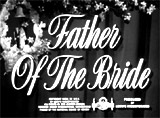

Father of the Bride (1950), 94 minutes, D: Vincente Minnelli
Director Vincente Minnelli's and MGM's satirical domestic comedy told about a wedding ceremony, and all the travails and joys of a harrassed father experiencing his only daughter's expensive wedding. In the opening voice-over narration of harrassed and exhausted father, Stanley T. Banks or "Pops" (Oscar-nominated Spencer Tracy), talked directly to the camera about the stresses before (and after) a lavish June wedding for his 20 year-old daughter Kay (Elizabeth Taylor), and his recollections of how she had grown up so fast to become engaged - with an extravagant marriage ceremony that had just occurred. During the film's lengthy flashback that told the witty and contrived story of the previous three months leading up to the wedding, Stanley realized that his 'little girl' Kay was soon to be leaving in anticipation of her marriage. Stanley desired to "get a peek at this Superman," his daughter's fiancee, Buckley Dunstan (Don Taylor) from the front window, and had a pained reaction. In the middle of the night, Stanley frantically worried to his wife Ellie (Joan Bennett) about Kay's choice of a fiancee: "We don't know a thing about him. Not a darn thing. Not where he comes from, what he makes, or what he makes making it." They had a lengthy, one-sided "man-to-man" financial talk (three months before the nuptials) to determine if Buckley could suitably support Kay. During the required meeting of the Banks to get to know the wealthy in-laws the Dunstans, Herbert or "Herbie" (Moroni Olsen) and Doris (Billie Burke), Stanley admitted: "We did more bare-faced lying in those few minutes than we had done in our entire lives." In the scene of the Banks' party to announce the engagement, Stanley found himself confined to the kitchen and was unable to deliver his prepared speech. Stanley became exasperated about how everyone else was spending his money, but soon realized he would lose the battle for a small wedding: "From then on, I was a dead duck." Stanley was completely flabbergasted by the amount of clothing being purchased for the event, and all of the other included expenses: ("It's only two syllables from Banks to bankruptcy...What are people gonna say when I'm in the gutter because I tried to put on a wedding like a Roman emperor?"); eventually, Stanley gave in to the entire guest list. Stanley faced his daughter's overbearing caterers, led by fussy caterer Mr. Massoula (Leo G. Carroll): ("An experienced caterer can make you ashamed of your house in 15 minutes"). Once the RSVPs for the invitations began to arrive, Stanley was dismayed by the many positive responses. Then, Kay abruptly announced that "the wedding's off" during a sudden explosion of emotion, after Buckley impulsively proposed that the couple go on a fishing trip in Nova Scotia for their honeymoon; Buckley arrived to sincerely apologize for his awful and selfish lack of judgment with Kay. Stanley was forced to intercede after the couple's fight and make things right between the feuding couple, and the two quickly reconciled their differences. During the botched church rehearsal for the wedding arrived, the groom Buckley and the minister Rev. Galsworthy (Paul Harvey) were absent from the proceedings, and the rehearsal run by the minister's assistant Mr. Tringle (Melville Cooper) was totally disorganized and chaotic. The night before the wedding, Stanley also experienced a nightmarish vision of what might happen at a disastrous wedding (he imagined himself appearing late, in tatters, and not able to walk down the springy and rubbery aisle, as his daughter screamed at him from the altar). Once he awoke from the nightmare during a midnight snack kitchen scene, he visited with his daughter as they shared a bottle of milk and sandwiches. She confessed her fears about the monumental wedding about to occur, and then complimented her father: "Nothing ever fazes you, does it?" The day of the wedding dawned with massive distractions and confusion over preparations in the house for the reception, including collisions between caterers setting up and movers taking out the furniture; however, Stanley then saw his daughter in her wedding gown, reflected in a triple-paned full-length mirror ("She looked like the princess in a fairy tale") - it was a wonderfully visualized moment. As Stanley played his part to give Kay away during the ceremony, he felt ambiguity and confusion about losing his only daughter: ("What's it going to be like to come home and not find her. Not to hear her voice calling 'Hi Pops' as I come in. I suddenly realized what I was doing. I was giving up Kay. Something inside me was beginning to hurt"). The film concluded with the chaotic reception back at the Banks home; Stanley missed her throughout the entire reception in the crowded house, in the midst of the hubbub and catering staff and the crush of the hordes of guests, he failed to see the throwing of Kay's bouquet from the front indoor staircase, and only caught a glimpse of her departing in the newlyweds' car. Later after the last guests departed, Stanley surveyed the "wreckage" in the house with Ellie, and suddenly felt how empty the house had become. In a concluding tearjerking scene, Kay made a post-wedding phone call (from the NY train station on her way to her Nova Scotia honeymoon) to lovingly say 'thank you' to her father: ("And Pops, you've been just wonderful. I love you. I love you very much. Bye bye"). Stanley delivered a memorable last line: ("Nothing's really changed, has it? You know what they say: 'My son's my son until he gets him a wife, but my daughter's my daughter all of her life.' All of our life").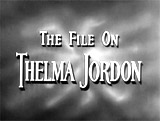




The File on Thelma Jordon (1950), 100 minutes, D: Robert Siodmak
The film noirish story centered around mysterious, duplicitous and treacherous femme fatale Thelma Jordon (Barbara Stanwyck) - as evidenced by the film's tagline: "...SHE'LL LIE...KILL OR KISS HER WAY OUT OF ANYTHING!" Thelma captured the emotionally-dependent heart of unhappily-married assistant District Attorney Cleve Marshall (Wendell Cory). Cleve's wife Pamela (Joan Tetzel) was more loyal to her wealthy father, and she constantly criticized him, pushing him to heavy drinking. Thelma chose Cleve as the duped fall-guy when she came to the office of chief investigator Miles Scott (Paul Kelly) to report threates of robberies at her home. She engaged in an adulterous and illicit (but genuine) love affair with Cleve, telling him: "Maybe I'm just a dame and didn't know it." She had even confessed to him, falsely, that she was lovelessly married and recently separated from shady jewel thief Tony Laredo (Richard Rober) - when in fact they had planned the crimes together. The misguided and self-deluding "fall guy" DA threw aside his family, future, and honor and helped to defend Thelma after her wealthy Aunt Vera Edwards (Gertrude Hoffman) was murdered. DA Cleve helped Thelma to reconstruct an 'untouched' version of the crime scene, so that neither of them would be suspected of foul play for tampering with evidence. Thelma seemed to imply to Cleve that Tony committed the murder during the robbery of her aunt's valuable emerald necklace, and made it look like an outside job. In reality, Thelma was the cold-blooded, calculating murderess. There was also suspicion about an unseen accomplice dubbed "Mr. X" (Cleve himself), who had assisted Thelma. Thelma became a prime suspect - she was charged for the murder (her Aunt's recently-rewritten will in her favor was a major factor). Love-struck DA Cleve took up the prosecution on her behalf, quietly hired defense attorney Kingsley Willis (Stanley Ridges) for Thelma, and manipulated the case to her favor. He circumvented revealed evidence of a dark life of blackmail, gambling, and relationship with her husband-partner-in-crime Tony, and she was found not guilty. After a post-trial rendezvous of Thelma with Tony, the couple planned to flee and live off her Aunt's inheritance. When Cleve arrived to be with Thelma, she told him that Tony had reappeared from Chicago for her ("I've always loved him...You must have known it, except you didn't want to know"). She admitted that Cleve had been set up to help defend her ("You were the fall guy, Cleve, right from the beginning"), and that she had killed Vera ("I'd like to say I didn't intend to kill her, but when you have a gun, you always intend if you have to"). After Tony knocked out Cleve from behind, Tony and Thelma fled together to go "as far away as possible." She struggled with accomplice Tony as he drove, trying to injure him with a burning-hot dashboard cigarette lighter. He died when their car crashed over a cliff and caught fire, while Thelma was hospitalized. During her deathbed scene, she made a full confession to Miles, but refused to identify "Mr. X." As she expired, she told Cleve: "You don't suppose they could just let half of me die?" Miles realized that Cleve was the mysterious "Mr. X."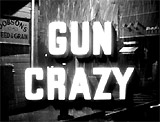




Gun Crazy (1949/1950) (aka Deadly is the Female), 87 minutes, D: Joseph H. Lewis
Director Joseph H. Lewis' supercharged, low-budget cult favorite - a noirish, Bonnie-and-Clyde love-on-the-run tale, was based on MacKinlay Kantor's story. It was a story about two sharpshooters who turned to a life of crime - a reckless couple fatally attracted to their firearms - and each other. It was one of the best B films ever made. In the opening scene (in the pouring rain), 14 year-old Bart Tare (Rusty Tamblyn) broke a hardware store display window to steal a pearl-handled gun and ammunition from inside, and then fell down in a mud puddle at the feet of the local Sheriff Boston (Trevor Bardette). In his troubled life, Bart was being raised by his older sister Ruby (Anabel Shaw). She claimed that although Bart was "gun-crazy," he had a strong aversion to killing things ("He wouldn't kill anything"). Bart was sent to reform school for four years because of his "dangerous mania" and then served in the Army. After serving in the military, gun-loving Bert Tare (John Dall) met blonde, trick sharp-shooter femme fatale Annie Laurie Starr (Peggy Cummins), portraying Annie Oakley in Packett's Wild West Carnival side-show - they were perfect companions. Bart was immediately hired by the overly-possessive Packett to work in the show, although it didn't last long after Bart moved in on Packett's girl, and Bart discovered that Packett was blackmailing her about a murder in the past that she had committed during a robbery in St. Louis with him. After being fired, the two wild, amoral lovers sought out a justice of the peace to get married, as Annie Laurie thought about how it might improve her life. They experienced an idyllic honeymoon, but then following a sudden downturn after a visit to Las Vegas, they found themselves in an impoverished and financially-strapped state. In their drab, cheap hotel room, during a domestic squabble brewing between the couple, Annie Laurie (naked under her terry-cloth bathrobe) seductively tempted Bart to pursue more crime with her - and commit armed robbery. She threatened to walk out on Bart unless they both engaged in a life of crime. The blackmail scene ended with his sexual acquiescence and gratification, his decision to remain, and a close-up of his mouth inching towards hers for a passionate kiss. The kiss dissolved into the gunshot blast of a gumball bowl during a holdup at a Travelers Aid hotel desk - an orgasmic, erotic/violent beginning of their crime rampage as gun-toting 'wild animals.' She was able to get him to agree to more holdups - portrayed as a series of small stick-ups and robberies - a liquor store, another store clerk, and a gas station. Annie Laurie pretended to be a hitchhiker to hold up a kindly driver who picked her up - they then stole his car for their next major heist. The next sequence was an unedited, virtuoso, single-shot uninterrupted (long take) robbery that occurred at a Hampton Bank (Illinois) - the two bank robbers were dressed in their Western showbiz cowboy-cowgirl outfits with guns. It was cleverly filmed from the back-seat of their robbery car (a stolen Cadillac). The scene extended from the time of their drive into town and up to the bank, including getaway driver Laurie's distraction of a cop (Robert Osterloh) on the sidewalk during the robbery; when Bart emerged with an alarm bell ringing, Laurie karate-chopped the policeman in the neck to knock him down and render him unconscious, and the two escaped with Bart driving - while the camera was still filming the long-take from behind their shoulders inside the car! Their next robbery's getaway was at the Rangers and Growers Exchange. The two killers were identified by vengeful carnival owner Packett who reported that Annie Laurie and Bart were his former employees. A full-scale manhunt across state lines was undertaken by the authorities. Bart was beginning to feel regret for his criminal lifestyle with the cold-hearted killer Annie Laurie. He was compelled to agree with her request for "one more job." According to her calculated plan, they could be rich for life and leave the country, but would first have to split for awhile so they wouldn't be recognized and caught. For one last carefully-planned payroll office heist at the Armour Meat Company Plant in Albuquerque, NM where they both had taken jobs (with fake names), the robbery turned deadly when Annie Laurie was forced to shoot and kill her supervisor, office manager Miss Augustine Sifert (Anne O'Neal) when she activated a burglar alarm, and a company security guard during their flight. They decided to remain together, and due to an intensive manhunt and dragnet and even involvement by the FBI, they were forced to flee to Southern California. The hunt for them tightened when their spending of twenty dollar bills in the area was traced back to the Armour plant. Their amour fou ultimately led to their tragic end in a foggy swamp near Bart's rural hometown, brought down by their violent, jarring, reckless natures. They collapsed on the ground and slept until dawn when they heard ominous footsteps and the voices of Bart's boyhood pals Deputy Clyde (Harry Lewis) and Dave (Nedrick Young) announcing their approach in the fog. In their last few moments of life and knowing that they were surrounded, Bart faithfully declared his love for Annie Laurie and gave her one final kiss. As the two came closer and Annie Laurie saw their figures in the fog, Bart was compelled to shoot his insane, aggressive lover as a mercy killing - the only murder he committed in the entire film. Mistakenly believing that Bart had fired on them, a barrage of police gunfire abruptly cut Bart down. With poetic justice, he fell next to her. Their bodies lay united together - with Bart on his back and Annie Laurie on her side.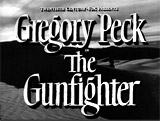

The Gunfighter (1950), 84 minutes, D: Henry King
Director Henry King's under-rated film was known as a seminal "psychological" western, semi-Greek tragedy, and noirish character study. It told about a cursed, notorious gunfighting outlaw with a bloody past. He was continually mythologized, looked at contemptuously, or targeted by many upstart gunslingers who wanted to challenge his reputation as the fastest gun in the West. This film was a glamorized account of a real-life, infamous historical gunfighter known as Johnny Ringo who probably shot unarmed men and was presumed to have committed suicide. In the movie version of the character, Ringo only killed in self-defense. In the film's opening set in the 1880s, reformed, legendary but weary 35 year-old Jimmy Ringo (Gregory Peck) with a violent past (and an impressive mustache) arrived one night in a saloon in a small SW town. Cocky and arrogant gunman Eddie (Richard Jaeckel), a young bully thought to himself: "Just two hands like anybody else." After self-defensively killing Eddie in the barroom, his 12th murder in similar circumstances, further forces were brought down upon Ringo. Subsequently, Ringo could not escape from Eddie's three vengeful murderous brothers who pursued him to the outskirts of town; there, he wounded one brother (David Clarke) who drew his gun, and disarmed the other two (Alan Hale, Jr, and John Pickard) before chasing off their horses; they faced a 3-hour walk to Santa Fe, NM. In the nearby town of Cayenne, NM in the early morning, Ringo entered an empty saloon, the Palace Bar, owned by bartender Mac (Karl Malden), who knew of Ringo and treated him with extreme deference. Ringo's old friend and ex-outlaw, now the town's reformed Marshal Mark Strett (Millard Mitchell) was alerted to the gunfighter's presence. The Marshal urged Ringo to leave town to avoid further trouble. While in town, Ringo hopefully awaited a reunion with his estranged wife (of eight years) - local schoolteacher Peggy Walsh (Helen Westcott) and their son Jimmie, Jr. (B.G. Norman) whom he had never met. According to the Marshal, she had kept her identity and son's identity a secret on purpose. Ringo found himself restricted, sequestered (and trapped) in the corner of the Palace Bar while he waited to speak to Peggy. At first, she refused to meet with Ringo when the Marshal asked her if she was interested in seeing him. After speaking to waitress-singer Molly Harris (Jean Parker), a recently-widowed saloon girl once married to Bucky Harris, one of Ringo's friends and gang members, she was able to convince Peggy to speak to him. Throughout Ringo's short stay in town, hot-shot, two-bit gunfighter and "loud-mouthed, barroom loafer" Hunt Bromley (Skip Homeier) had been lurking around Cayenne to confront him. Molly had earlier told Ringo that Bromley attempted to romance Peggy, but she had told him off. Bromley marched into the Palace Bar to purposely instigate a fight with Ringo, who cautioned the cocky young man to quit bothering him. Ringo insulted Bromley ("I heard about you. I heard you're a cheap, no-good barroom loafer"), and then held a gun on Bromley under the table pointed at his belly, to force him to leave the bar room. It was revealed that Ringo had bluffed Bromley and thoroughly humiliated him. At the same time, Eddie's three murderous brothers had acquired horses and guns and were on their way to town to seek vengeance. During Ringo's long-awaited, delayed meeting with Peg before he had to leave town, he told her about his desire to set aside his past reputation and move westward to California or the Northwest to start a new life on a ranch - with her and Jimmie: ("We could be safe out there the rest of our lives"). She balked at the idea: ("It's a wonderful idea, Jim. It's wonderful, but it's no use....It's too late"), but if in a year's time, he had reformed and changed his ways, she promised to seriously reconsider his invitation again. Their conversation ended with Ringo's hopeful words: "We can make it, honey. We can make it. You just wait and see." As he was about to finally leave town on horseback, later than he had expected in the film's conclusion, the 'gunfighter' was tragically felled (shot in the back) by multiple shots fired by Hunt Bromley. While dying, Ringo decided to tarnish the legend surrounding his life. He instructed Marshal Strett to tell the public that he drew first on Bromley, and was shot in self-defense. (If he didn't claim he drew first, Hunt would be hanged for murder, and his cursed legend would persist.) He wanted to curse Bromley by teaching him what life would be like as a notorious 'fast-draw' gunslinger - he would forever be a shooting target. The Marshal manhandled "yellow-belly" Bromley, took him into a barn and beat him up. Before ordering him to leave the territory, he warned him that many other gunslingers would now want to challenge 'the man who killed Jimmie Ringo.' Ringo's funeral was attended by Peggy who openly revealed her marital association as Mrs. Ringo (with Ringo's son), thereby forgiving him and reconciling with him in death. The final shot was a silhouetted view of "Ringo" (although dead and buried) riding off into the sunset.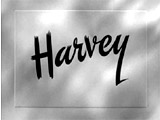

Harvey (1950), 104 minutes, D: Henry Koster
Director Henry Koster's screwball comedy with fanciful elements told about eccentric and cheerful, often inebriated and 42 year-old dipsomaniac Elwood P. Dowd (James Stewart) who had an invisible friend (identified as a "pooka" or mischievous Celtic-Irish spirit of mythology - "a fairy spirit in animal form") - a giant 6 foot three-and-a-half-inch rabbit named Harvey that accompanied him everywhere. He was oblivious that he was an embarrassment to his family and that others couldn't see his furry white friend. At Elwood's large residential estate, his peculiar personality and insane behavior (including references to his invisible and silent friend Harvey) had obviously become an embarrassment to his family, including Elwood's eccentric older sister Mrs. Veta Louise Dowd Simmons (Josephine Hull), and Veta's unmarried daughter Myrtle Mae Simmons (Victoria Horne) - Elwood's niece. Elwood was accused of continually driving people away due to his lunacy, and causing his family members to feel "disgraced" and become social outcasts, while preventing Myrtle from meeting eligible young men. As Veta and Myrtle were preparing a secret Wednesday afternoon tea party or forum (with a reception and social program) for some of the prominent members in the community, they worried that if Elwood returned home, he would spoil everything, disrupt the event and disturb their guests - and later their fears came true. Meanwhile, as Elwood had left home and walked about town, he carefully guided Harvey across a busy street, causing befuddlement amongst townfolk who saw him talking presumably to himself (they couldn't see his large furry white friend). He often spent time drinking in Charlie's Bar, where he ushered Harvey to a seat at the bar. The bartender Mr. Cracker (Dick Wessel) humored Elwood by acknowledging his friend and accepting his strange behavior. Elwood ordered two martinis, one for himself and one for Harvey. Although Veta questioned Elwood's sanity, she surprisingly and ironically occasionally could see Harvey and acknowledged his presence. Veta led efforts to get Elwood committed to an insane asylum, Chumley's Rest, run by Dr. William Chumley (Cecil Kellaway). She convinced Elwood to join her in a drive to the front of the gated institution. Inside the hospital while Elwood was being incarcerated, Veta spoke to Nurse Miss Ruth Kelly (Peggy Dow), and to attending young assistant physician Dr. Lyman Sanderson (Charles Drake) in his office. Veta insisted: "I want him committed out here permanently because I cannot stand another day of that Harvey!" Due to her absurd insinuations about her brother and a rabbit, Dr. Sanderson thought that she was a mental case herself, and she was immediately admitted for treatment instead of Elwood. Sanderson - who feared that he had acted in error and mistreated Dowd, informed his superior Dr. Chumley. Both thought that the hospital would be charged with false commitment, wrongful incarceration and rough treatment of Dowd, so Sanderson immediately released Dowd, but kept Veta for temporary observation. Shortly later, Dr. Chumley realized that Dowd was actually the insane one, and a town-wide search commenced for Elwood to return him to Chumley's. Meanwhile, Veta was delivered back to the Dowd house - she was hysterical and threatening to have Judge Gaffney (William Lynn) sue the hospital for mistreating her. Four hours later, Elwood was eventually tracked down to Charlie's Bar but found alone. He had been talking to Dr. Chumley, and had magically convinced Dr. Chumley of Harvey's existence: ("At first, Dr. Chumley seemed a little frightened of Harvey, but that gave way to admiration as the evening wore on"). Elwood was grabbed and taken back to the sanitarium, where he met with Dr. Chumley privately in his office. Dowd bragged how Harvey had miraculous powers - he could stop time and magically send anyone to a destination. Dr. Chumley described a therapeutic dream trip he wished to take to Akron, Ohio. After all of the other characters arrived at the hospital (by cab), Dr. Sanderson recommended that Dowd could be cured of his third-degree hallucinations of the rabbit ("to shock him back to reality") with a serum injection of "Formula 977." Dowd politely agreed to the treatment to please his elder sister Veta, who vehemently objected to his initial refusal to be cured. But when Veta clearly saw that Dowd's cure would be worse than his ailment, she intervened to stop the injection. In the film's conclusion as Elwood left the facility on foot with Myrtle and Veta, Harvey briefly remained behind with Dr. Chumley (who asked: "Have you ever been to Akron?"), but after an instantaneous trip of two weeks to Akron with the doctor, Elwood was joined by his trusted and preferred invisible friend Harvey as they walked out of the hospital's gates toward the bus stop.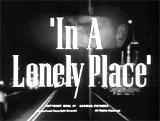


In a Lonely Place (1950), 94 minutes, D: Nicholas Ray
This mature, bleak and dramatic 1950 film noir from maverick director Nicholas Ray was based on a complex script by Andrew Solt. It told about a volatile Hollywood screenwriter who became a murder suspect and was provided an alibi by his neighbor - an aspiring actress. World-weary, acerbic, cynical, self-destructive, hot-tempered, depression-plagued Hollywood screenwriter and, hard-living but laconic anti-hero Dixon Steele (Humphrey Bogart) was planning to adapt a trashy best-selling romance novel for the big screen. Dixon met simple-minded, naive, celebrity-obsessed hat-check girl Mildred Atkinson (Martha Stewart) at Paul's Restaurant. She was reading the novel that he would soon be adapting into a screenplay, so instead of reading the novel, he relied on a synopsis of the book from Mildred. She was invited to his apartment in the late evening to provide him with an overview of the lightweight, second-rate book he hadn't read himself. At 12:30 am, Dixon offered Mildred cab fare instead of driving her home as he earlier had promised. The next morning, at 5:00 am, Dixon was accosted at his home by Beverly Hills detective Sgt. Brub Nicolai (Frank Lovejoy). Dixon was taken to the Beverly Hills Police Department to engage in a recorded interrogation with Brub's overzealous boss Police Captain Lochner (Carl Benton Reid). He was accused of murdering Mildred via strangulation, and then dumping her body by the side of the road. Dixon's beautiful but cool blonde next-door apartment neighbor and would-be starlet Laurel Gray (Gloria Grahame) was also called in for questioning in the detective's office. She provided an alibi for Dixon when she confessed that he did not leave with the murder victim when he said goodnight to the female at his door. Later, Dixon complimented Laurel in providing a life-saving alibi based upon his attractive face, and they became mutually attracted to each other. Dix and Laurel began a love affair and they were initially happy, but tensions between them grew when the investigation into him persisted (and he was under secret surveillance), and she became increasingly suspicious and began to back away. She clearly saw him as a man whose own sur-'face' hid terrible, uncontrollable and ferocious anger, and feared that he was violent and capable of murder - possessing a "sick mind with an urge to destroy." A foreshadowing of the end of their own fragile affair occurred during a late-night drive, with Dixon's words to Laurel: "I was born when she kissed me. I died when she left me. I lived a few weeks while she loved me." Their romantic relationship was ultimately put to the test as she became increasingly suspicious of his disintegrating self. Out of fear, Laurel accepted Dixon's desperate and sudden marriage proposal, to avoid aggravating him or getting into an argument due to his inherent, explosive nature. However, she was seriously contemplating leaving town to avoid marrying him, and she hurriedly packed her bag inside her locked apartment's bedroom to leave. Dix forced his way in to her apartment and realized Laurel was packing - not for a honeymoon trip to Las Vegas - but to run away from him to New York. In a rage, he nearly strangled the woman he loved. He was only interrupted by a ringing telephone with a startling message, informing him that Mildred's boyfriend Henry Kesler (Jack Reynolds) had confessed to her murder. In the film's unhappy ending, it was too late to save their relationship. Laurel uttered teary, murmured words of goodbye to Dixon as he walked away after their relationship had completely deteriorated, and he disappeared through an outer archway to the street: "I lived a few weeks while you loved me. Goodbye, Dix."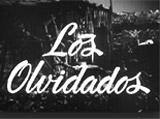
Los Olvidados (1950, Mex.) (aka The Forgotten Ones, or The Young and the Damned), 85 minutes, D: Luis Bunuel
Luis Buñuel's nihilistic and grim cautionary tale was one of the greatest, and harshest, socially-realistic films ever made. It was filmed in stark black and white cinematography, and was set in the slums of Mexico City populated by gangs of street kids. A juvenile delinquent gang in Mexico City led by amoral, older, violent reform school jail-escapee and miscreant El Jaibo (Roberto Cobo), committed horrific, sadistic acts of murderous brutality and petty crime, including the merciless robbery and beating of blind street musician Don Carmelo (Miguel Inclán), and the destruction of his drum. In the next sequence set near a half-built, high-rise building, Jaibo (in denim overalls) vengefully beat rival Julian (Javier Amezcua) to death by striking him from behind in the head with a large rock (hidden in a fake arm sling) and then stole his money, in retaliation for Julian allegedly reporting him to police and sending him to jail. The film's most sympathetic main character was the youngest gang member Pedro (Alfonso Mejía) in Jaibo's gang; he was bribed (with some of Julian's stolen money) to not report Jaibo's act of murder. Pedro prostituted himself to survive by accepting homosexually-pedophilic advances. Because he was the offspring of a rape, he was unloved by his widowed mother (Estela Inda) with four children. In a famous, unsettling surrealistic dream sequence (in slow-motion and chiaroscuro), Pedro had visions of Julian's blood-stained face and dead body under his bed (he had witnessed the murder) with chicken feathers floating in the air, and then he saw his unloving mother floating toward him with a large slab of rotting raw meat as a lightning bolt struck (she normally deprived him of food). Suddenly, Jaibo reached from under the bed with his long distended arm and snatched the meat, as the dream ended. To attempt to reform himself, Pedro took a job as a blacksmith apprentice. There, he was wrongfully set up by Jaibo for a theft crime (of an expensive knife). Charged with the crime, Pedro was sent to a rehabilitation "farm school" center where he misbehaved and killed two chickens. To test Pedro's honesty, the school's principal gave Pedro 50 pesos for an errand to purchase cigarettes. While on the way to buy the cigarettes, the menacing Jaibo stole the money, and the two boys got into a vicious fist-fight. Although the fight ended in a draw, Pedro loudly announced that he had seen Jaibo kill Julian. The revelation was heard by blind street musician Don Carmelo, who reported it to police. As a result, Jaibo retaliated by tracking down and vengefully killing Pedro (during a brief, dark scene). Jaibo died when he attempted to escape and was shot with two gunshots by the police as he left the murder scene - (during his surrealistic death, a mangy stray dog ran toward the camera and was superimposed over his face as he swooned and died). Pedro's body was found by Meche and her grandfather, and to avoid the police, his corpse was gracelessly disposed of. It was put in a sack and carried out of town on a donkey, to be dumped down a garbage-covered cliff -- while Pedro's mother passed in the street, ironically not knowing her lost son was dead.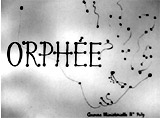


Orphée (1950, Fr.) (aka Orpheus), 112 minutes, D: Jean Cocteau
Jean Cocteau's visually-beautiful, eccentric, surreal, romantic fantasy drama was set in post-war 1950s Paris - it was a retelling of the classic Greek Orpheus myth (about a musician's descent into the underworld to reclaim his dead wife). The title character was light-haired, famous, handsome and popular Left Bank (Parisian) existentialist, middle-aged poet Orphée or Orpheus (Jean Marais), who was obsessed with Death; he was married to his beautiful but unhappily neglected and pregnant wife Eurydice (Marie Déa). In the opening scene, Orphee was visiting inside the Café des Poètes (Poet's Cafe) in modern-day Paris, talking about how younger resentful poets scorned his success. A black Rolls Royce pulled up outside commanded by the Princess (Maria Casares). It was driven-chauffeured by her assistant Heurtebise (François Périer) - later revealed to be a man who had recently committed suicide by gassing himself to death. Orphee's poet rival, Jacques Cégeste (Édouard Dermithe), patronized and supported by the Princess, emerged from the car. A chaotic brawl broke out inside and outside the cafe, and the drunken Cegeste, who broke free when he was being taken into custody by police, was struck and killed by two motorcyclists on the street. The Princess - representing, depicting and personifying Death (revealed later), ordered the transport of Cegeste's corpse in the Rolls Royce parked outside to the 'hospital', and firmly urged Orphee to accompany them as a 'witness.' The first of many cryptic radio messages was heard on the Rolls Royce's radio. After dark, the car was escorted by the Princess' two henchmen: they were male, helmeted motorcycle riders dressed in black leather and wearing high boots - they were the ones responsible for Cegeste's death. The car was driven to the ruins of an abandoned chateau, where the Princess magically revived or reanimated Cegeste from death. He and the Princess (and the two motorcyclists) passed into the Underworld (through a mirror), but Orphee was unable to follow after them. After returning home after being given a ride by Heurtebise, Orphee was told that Cegeste's body had mysteriously disappeared, and couldn't be located. He began to receive cryptic messages from Cegeste's spirit, as well as nocturnal visitations from the Princess who entered through his bedroom's mirror and watched him sleep. Orphee had invited Heurtebise to live in his house and to store the Rolls in the garage, where he sat in the vehicle and obsessively listened to the radio that was broadcasting abstract poetry and coded messages from the afterlife. As the film progressed, a love triangle developed between Orphee and the Princess (a symbol of Death) who visited him in his dreams, while the love-struck Heurtebise (the Princess' chauffeur) romanced Eurydice, Orphee's dead wife. Eurydice was struck down while riding her bicycle (off-screen) - she had been killed by the Princess's leather-clad motorcycle men and taken to the underworld. Orphee was advised by Death's chauffeur Heurtebise, a faithful guide, about how to enter the underworld through his bedroom mirror-portal - to return Eurydice to life. Orphee crossed into the dreamy underworld to reclaim Eurydice by passing through a glass mirror. Orphee was brought before a tribunal panel of judges for interrogation in the afterlife or underworld. The Princess was forced to admit the reason for illegally taking Eurydice (and breaching her authority) - it was because of her love for Orphee. The judges' decision was that Eurydice would be returned with Orphee to the living world, but only if he never looked upon her again. If he looked upon her, he would lose her again. Heurtebise was allowed to join them, to assist the couple with their new restrictive lives. In one of the film's most shocking moments, via the rear-view mirror, Orphee caught a brief glimpse of his wife Eurydice sitting in the backseat of the Rolls Royce parked in the garage, causing her to immediately disappear. Shortly later outside his home, Orphee was killed when accidentally shot by a member of a vengeful mob from the Cafe that accused him of murdering rival poet Cegeste. In the film's resolution, the deceased Orphee returned to the afterworld with Heurtebise, but was again sent back to the living world (by walking backwards in reverse) to be with Eurydice, with their memories erased. The "immortal poet" would soon become a father with his first child with Eurydice. Meanwhile, Heurtebise and The Princess/'Death' would now become judges in the Underworld.



Panic in the Streets (1950), 96 minutes, D: Elia Kazan
Director Elia Kazan's noirish, dramatic psychological thriller was filmed entirely in the city of New Orleans, in a gripping tale of a tense chase after possibly infected criminals by a US physician and the authorities to curtail the spread of a potentially-deadly plague epidemic. In the semi-documentary dark plot, three gangster criminals, including a menacing Blackie (Jack Palance) and his two henchmen Raymond Fitch (Zero Mostel) and Kochak's cousin Poldi (Guy Thonajan), were involved in the murder of Kochak (Lewis Charles) during a waterfront poker card game dispute on a New Orleans wharf. During a morgue autopsy on the corpse of the recently-arrived illegal alien (an unidentified Kochak), it was discovered and confirmed by US Public Health Service Lt. Commander Dr. Clinton Reed (Richard Widmark) that the deceased was a prime carrier of the 'pneumonic plague' (a variant of bubonic plague). While by-the-book, dim-witted, law-and-order Police Captain Tom Warren (Paul Douglas) and Dr. Reed traced down Kochak's killer in a race again time, it was important to keep the incident top secret to prevent mass panic during their 48 hour search window. Clues such as rustproof paint and shrimp tracings, found on Kochak's clothing, led to the discovery that the dead man was a smuggled stowaway on the Nile Queen, a tramp steamer. During the case, the investigators discovered that Kochak was probably Armenian, liked shish-kabob, and had boarded the ship at Oran (in Algeria). They traced Kochak's wanderings to a Middle Eastern (Greek) restaurant owned by John Mefaris (Alexis Minotis), who denied knowing about Kochak until after his affected and contaminated wife Rita died. One of the killers, Blackie, suspected that his sidekick Poldi (who was very ill) received expensive, contraband smuggled goods from Kochak. Simultaneously, a persistent reporter was threatening to break the story in the morning paper - leaving only four hours remaining. In the film's concluding moments, a chase ensued by Reed (accompanied by the police) in pursuit of Blackie and Fitch (who had thrown Poldi to his death). The gunfight and pursuit began at a waterfront coffee warehouse, and went through depots, docks and a warehouse, and ended with Blackie accidentally shooting and wounding Fitch, and the police taking the two into custody. With the crooks apprehended, the pathogenic plague could be contained and restricted successfully.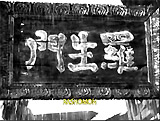

Rashomon (1950, Jp.), 88 minutes, D: Akira Kurosawa
Director Akira Kurosawa's cinematic, landmark masterpiece was about the nature of truth and the shaping of perceptions from different perspectives. This multi-layered film replayed (in flashback) the same crime story multiple times from different characters' eyes as they told incompatible, contradictory tales of a mysterious 'rape' and murder in the woods in 12th century feudal Japan. The film opened under the shelter of Rashomon (the ruined South gate to modern day Kyoto), during a steady downpour, as woodcutter Kikori (Takashi Shimura) told a "strange" and "horrible" story (from three days earlier) to a commoner (Kichijiro Ueda) and temple priest Tabi Hōshi (Minoru Chiaki). He had discovered a murdered samurai nobleman while he was in the woods. In a marvelous moving tracking shot through the forest, the woodcutter first found four pieces of evidence (a woman's reed hat with veil, a samurai's cap, a cut-up piece of rope, and an amulet case) before he found the body. He reported his story to the police along with the priest, who reported that he saw the samurai traveling with his wife the day of the murder (or suicide). Then, they listened to the arrested and captured bandit who was injured (after being thrown from the samurai's stolen horse). The outlaw/bandit Tajōmaru (Toshirō Mifune) told his version of the story. He watched from the cover of the dense forest when he glimpsed the wife Masako (Machiko Kyo). She was concealed under a large hat and veil, while led on a horse by her samurai husband (Masayuki Mori). When the bandit glimpsed her bare feet and the camera panned up to partially reveal her face through the open veil, he was awestruck by the sight and coveted her. The bandit chased after them to confront them. He lied to the husband and led him deep into the woods where he attacked him (and tied him with a rope to a pine tree). He returned to the wife who fully opened her veil to him. He told her the samurai was sick. She turned pale and looked at him with "frozen eyes." The bandit changed his feelings about her husband. He dragged the wife back into the forest, where the wife fiercely defended herself with an expensive dagger, but then exhausted, she yielded and let herself be seduced by the bandit. The samurai was released and the two men dueled to the death over the wife's honor. The bandit killed the samurai, but then the scared wife ran away. In the wife's completely contradictory testimony, the "docile" woman claimed she yielded to the bandit (while her "horrified" husband was tied up) and then the bandit partially untied the husband and ran off. The wife was distraught that her cold and loathing husband wouldn't forgive her. She grabbed the dagger, cut the remaining ropes, held out the dagger and begged: "Now kill me. Kill me at once." As the husband kept coldly staring at her, she fainted with the dagger in her hand. When she awoke, she found her husband dead with the dagger in his chest. She somehow fled from the woods and attempted to commit suicide by throwing herself in a pond, but as she admitted: "I failed to kill myself." In the samurai's testimony (via a medium), after the rape (with her "virtue stained") while the samurai was still tied up, the wife begged ("Take me wherever you want"). She agreed to join the bandit and asked for the bandit to kill her husband. The bandit was so shocked by his unfaithful wife's request that he asked the samurai ("What do you want me to do with her? Kill her or save her?"). The samurai was ready to pardon the bandit for his crime. At that moment, the wife fled and got away. The bandit set the samurai free. Left by himself, the samurai committed suicide with his wife's dagger by thrusting it into his heart, but later, it was missing from the scene of the crime (someone had removed it from his heart). Back at the Rashomon gate, the woodcutter's objective account contradicted the other three stories - he had seen both the rape and murder (but didn't testify because he didn't want to get involved). He claimed the bandit begged the samurai's wife to marry him ("Marry me please! If you say no, I have no choice but to kill you"), but she refused and instead freed her husband's rope with the dagger. The samurai told the bandit: "I refuse to risk my life for such a woman" and called her a "shameless whore." The conniving wife called her reluctant husband "weak" and urged both men to fight for her love ("A man has to make a woman his by his sword"). When the two men began to duel for her, she hid her face in fear. The fight was actually not as bold, passionate, noble or dramatic as the bandit had recounted. However, the outlaw was able to kill the samurai, and afterwards, the fearful wife fled from him. As he left the scene, the bandit took the samurai's sword with him. In the epilogue, it was revealed that the reason the woodcutter was reluctant to testify was because he was also "a bandit" who had taken the pearl-inlaid dagger from the murder scene. However, he was redeemed in the eyes of the suspicious priest when the woodcutter revealed that his motives were not dishonest or selfish. He decided to adopt an abandoned baby - although he already had a family of six children. As the woodcutter walked home with the baby in his arms, leaving the Rashomon gate, the rainstorm stopped and the sun began to shine.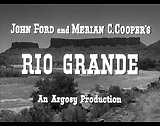

Rio Grande (1950), 105 minutes, D: John Ford
This was the third of Ford's "Cavalry Trilogy" (the best of the three by most accounts) with John Wayne's third appearance in the trilogy, and a co-starring role by Maureen O'Hara (who would also appear with Wayne in Ford's future film The Quiet Man (1952) and three other films). In the plot, promoted, duty-devoted Lieutenant Colonel Kirby Yorke (John Wayne) was the commander at the remote outpost of Fort Starke in the summer of 1879; the area on the Texas frontier near the Mexican border (marked by the Rio Grande River) was threatened by renegade Apache Indians, who often would cross the river during guerrilla raids, and then retreat by recrossing the river to sovereign Mexican land, where the US Cavalry was disallowed from taking action. Yorke's son Trooper Jefferson "Jeff" Yorke (Claude Jarman, Jr.) whom he had not seen for 15 years, had been expelled from West Point's Military Academy as a cadet in officer's school after flunking mathematics. To Col. Yorke's surprise, Jeff had enlisted in the US army and was assigned to his father's outpost for service as a low-level cavalry trooper. The younger recruit Yorke was refused favoritism-treatment by his father, and then was warned about finding glory in the service. Yorke's estranged, socially-privileged southern wife Kathleen Yorke (Maureen O'Hara) of 15 years, also the mother of Jefferson, made an unexpected arrival with a supply wagon. Although the reunited couple wouldn't admit it and had their differences, they were secretly attracted to each other, but didn't want to show their renewed romantic feelings for each other. Kathleen was there to attempt to buy out her son Jefferson's US Army service for $100 in Yankee gold, to discharge him and return him home, although both Comm. Yorke and the green recruit objected - he insisted on not signing discharge papers and remaining at the post. There was also long-standing tension between Yorke and his wife due to the past torching of the crops and barns at Bridesdale, her plantation home in the Shenandoah Valley during the Civil War; years earlier. Due to Yorke's "sense of duty," he turned cold toward her, and worried that they could never reestablish their relationship, as she continued to stubbornly insist on removing Jeff from his command. Yorke's superior officer Gen. Sheridan (J. Carrol Naish), who had arrived at the outpost, ordered Yorke and his regimental troops to enter Mexico (by crossing the Rio Grande), to pursue and eliminate marauding Apaches. Although he objected to the improper command, he proceeded to comply to Sheridan's orders by first evacuating the outpost of women and children (including his wife) to seek refuge at nearby Fort Bliss, with young Jeff serving as their escort rather than staying with the main regiment. The western concluded with Commander Yorke ordering his troops to rescue the caravan from the outpost (including his wife and other innocent women and children) attacked by the Apaches, with a small group of young abductees taken away and held in a small Mexican village's church, across the Rio Grande. During the battle in which Jeff displayed his heroism and bravery, his father was wounded with an arrow in the chest. Jeff was ordered to remove the arrow ("Pull it out, Jeff. Go ahead") and help his father ride back to the fort ("Son, help me to my horse") after the children were secured. The romantic relationship between Yorke (who was recovering from his wound) and his wife was rekindled as the film ended, and many of Yorke's regiment members, including Jeff, were commended for their dedication.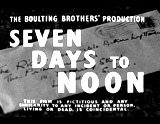


Seven Days to Noon (1950, UK), 94 minutes, D: John Boulting and Roy Boulting
This dramatic, atmospheric, tense and suspenseful thriller from two UK twin brother-directors, with an Academy Award for Best Screenplay, was filmed at the start of the Cold War (and Atomic Age). In the thought-provoking plot, rogue English scientist Professor John Willingdon (Barry Jones) sent a letter to the British Prime Minister - Honorable Arthur Lytton (Ronald Adam). It stated that he had stolen an atomic-nuclear bomb from his suburban government research facility (the Wallingford Research Centre), and threatened to detonate it in the center of London if the Government didn't announce the curtailment of further development of atomic weapons within "seven days." He was distressed, disillusioned and troubled that his life's work had been put to an evil purpose. Special Scotland Yard agents, headed by Detective Superintendent Folland (André Morell), and the military and police were deployed to investigate the threat by the seemingly-deranged, home-grown terrorist. It was confirmed that a small UR12 nuclear bomb was missing from the research centre - Willingdon was carrying it in a small bag/suitcase. Stephen Lane (Hugh Cross), Willingdon's loyal assistant and future son-in-law, joined the search. Meanwhile, Willingdon had not returned to his home to his wife Mrs. Willingdon (Marie Ney) or distraught daughter Ann (Sheila Manahan), and was attempting to disguise his appearance (by shaving his mustache and buying a different overcoat), and hiding out by renting a room from landlady Mrs. Peckett (Joan Hickson) in a boarding house for a night. During the city-wide hunt for Willingdon, he spent another night in the apartment of aging burlesque-actress Goldie Phillips (Olive Sloane). The media pressure forced the Prime Minister to publically announce over the radio the threat to the nation, and he ordered martial law and an immediate evacuation of the 12 square miles around Parliament, and the clearance of the city center commenced. Sensing that he was trapped, Willingdon returned to Goldie's apartment and took her hostage for a few days, until he was forced to flee when the house-to-house manhunt approached closer. He visited Westminster Chapel, a London church (still damaged from The Blitz) to meditate shortly before the deadline - noon on Sunday. He was apprehended there by Folland and Lane, but panicked, broke free and ran outside, where he was shot and killed by a soldier. The bomb was disarmed and dismantled by Lane just as the clock reached 12 noon.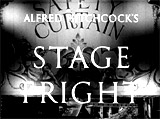

Stage Fright (1950, UK), 110 minutes, D: Alfred Hitchcock
Hitchcock's lesser, film noirish murder-mystery thriller, filmed in the UK, was based upon Selwyn Jepson's 1947 novel that first appeared as a series of short stories in Collier's Magazine in 1947. In the plot, American-accented, aspiring actress Eve Gill (Jane Wyman), daughter of Commodore Gill (Alastair Sim) and his estranged wife Mrs. Gill (Sybil Thorndike), was enrolled at London's Royal Academy of Dramatic Arts (RADA). She was inexplicably and secretly dating a good friend - another boyish-looking actor named Jonathan Cooper (Richard Todd). The unbalanced Jonathan confessed to her that he had just been implicated in the murder of the husband of flamboyant, West End musical comedy star and singer Charlotte Inwood (Marlene Dietrich), his own secret lover. His account put the blame on Charlotte, and it indeed appeared that Charlotte had framed him. In a dramatized and very deceptive flashback (later proven to be untrue), he claimed that Charlotte had come to his door, wearing a blood-stained dress and confessing that she had just killed her husband during a quarrel. In his account, he described how he offered to go back to Charlotte's house to get her a clean dress, and also to arrange the murder scene to make it look as if there had been a bungled robbery. However, he had to flee when Charlotte's lower-class, frequent pub customer and dresser-maid Nellie Goode (Kay Walsh) appeared and identified him. During an escape attempt in his car, Jonathan's car briefly stalled as police pursuers pounded on his "safety glass" windows that broke just as the car finally started. Frantic and on the lam, Jonathan sought refuge with Eve, who was helped by her father to hide Jonathan to evade police as an investigation commenced. Eve also proceeded to try and prove that he was innocent of the charges, while Charlotte (who returned to her career) was presumed to be the guilty one. Nonetheless, Jonathan became the prime suspect, but was he framed by Charlotte, or was he really involved? While 'playing' amateur detective, Eve adopted several disguises to avoid being identified (i.e., her most memorable impersonation was as maid Nellie's cousin - Cockney maid Doris Tinsdale who took Nellie's place). During the investigation of the case, Eve learned that Charlotte had ended her relationship with Jonathan - a motive to jealously commit murder, and Charlotte was also having an affair with her manager Freddie Williams (Hector MacGregor). Eve also found herself the victim of Nellie's blackmailing scheme when she was forced to pay more bribe money in order to continue the masquerade. Eve also slowly began to fall in love with the genuine detective, often-mumbling Inspector Wildred O. "Ordinary" Smith (Michael Wilding). As the film began to reach its climax, there were three exciting set-pieces: (1) to elicit a confession from Charlotte during a garden party performance under a tent, a bribed young boy walked down the aisle and onto the stage to deliver a doll with a blood-stained dress to Charlotte, (2) Eve also tried to blackmail Charlotte and goad her into confessing; in a conversation that was broadcast via a hidden microphone to the police, Charlotte admitted that she had planned and conspired to kill her husband, but it was Jonathan who had committed the deed (with Charlotte present), and (3) in a spine-chilling and claustrophobic sequence while Jonathan and Eve were hiding in a theater prop room below the stage, he admitted that his earlier 'flashback' story was a lie - he was the one who had smeared blood onto the dress, and was goaded into jealously murdering her husband when Charlotte ended her relationship with him and was preparing to marry Freddie. Eve begged Jonathan to turn himself in, but then he threatened to kill her to prove his insanity. She calmly pretended to help Jonathan escape, but then trapped him inside a bolted-locked door and summoned the police. As Jonathan was pursued, he died when a heavy iron safety curtain was dropped like a guillotine from above to cut off his exit route.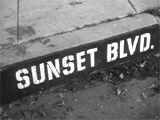



Sunset Boulevard (1950) (aka Sunset Blvd.), 110 minutes, D: Billy Wilder
Writer/director Billy Wilder's witty and cynical black comedy was about a famed silent film star who refused to accept the end of her stardom while attempting a comeback. The perverse, cynical film referenced silent star Gloria Swanson's actual career, with excerpts from one of her unfinished films (Queen Kelly, directed by Erich von Stroheim, one of the film's stars), cameos by other forgotten silent film stars (e.g., Buster Keaton), a cameo from columnist Hedda Hopper, and an appearance by Cecil B. DeMille, one of Swanson's earlier film directors. Some of the scenes were also set at the actual Paramount Studios. The film's opening was narrated in voice-over by a dead corpse - a victim floating face-down in a Sunset Boulevard gothic mansion's swimming pool. The dead man's voice belonged to aspiring, debt-ridden, down-on-his luck screenwriter Joe Gillis (William Holden), who - during a flashback - was forced to hide out at a secluded, decaying estate while hiding from creditors ready to repossess his car. There, he met the faded, once-great film queen Norma Desmond (Gloria Swanson) and her butler/chauffeur Max (Erich von Stroheim). When the delusionary star offered to hire him to write a script for her impending comeback for a screen version of Salome, the desperate writer manipulatively took advantage of her desire to return to fame by encouraging her false hopes and moving in as her 'kept man' gigolo. During his time at the mansion, Joe learned that Norma's false dreams and victimization were being encouraged by Max, who was writing forged fan letters to her. The ambivalent 'kept man' scriptwriter balanced his exploitative dependence upon the film star with romantic attention toward young script-reader Betty Schaefer (Nancy Olson) at Paramount, creating a lethal situation. At one point in the film, Joe and Norma were summoned to Paramount Studios, where Norma believed she was utterly adored by her many fans as she met with her mentor Cecil B. DeMille (as Himself). However, the reason for the studio meeting was unrelated to Norma's presence - Paramount had only wanted to use her vintage automobile for a film. When Joe was eventually forced to confess to Norma that he had been lying to her about his secret relationship with Betty, and attempted to make her face facts about her career, Norma suffered a nervous breakdown. As the film approached the opening swimming pool scene, Norma shot and killed Joe - who fell into the swimming pool. The film came full circle as police and authorities were summoned to the mansion, where Norma disintegrated further into madness, and was unable to distinguish the difference between illusion and reality. She believed that the reporters, police, and columnists (with photographers) were there to create a newsreel about her, and document her major comeback. Norma descended her marble staircase, where she uttered the famous closing line: "All right, Mr. De Mille, I'm ready for my close-up."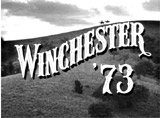

Winchester '73 (1950), 92 minutes, D: Anthony Mann
Director Anthony Mann's unique and classic, noirish black and white "psychological" western film was based on a story by Stuart Lake - and the first of eight films (five westerns) pairing James Stewart with director Mann. It had all of the stereotypical attributes of an 'oater' (ie., a law-abiding town run by Marshal Wyatt Earp (Will Geer), an exciting shoot-out rifle competition, a decisive poker card-game, a buckboard chase, Indians on the warpath attacking a besieged group of cavalry troopers, a shoot-out between desperados and a posse, a deadly saloon fight, a bank robbery, a frantic horse-chase, and a cliffside rifle duel to the death). Accompanied by his longtime friend-sidekick High-Spade (Millard Mitchell), a hard-bitten frontiersman Lin McAdam (James Stewart) participated in a Fourth of July markmanship shooting contest in Dodge City, Kansas to win a prized 1873 Winchester repeating rifle. Although he won, the rifle was soon stolen by his surly, runner-up opponent - outlaw 'Dutch' Henry Brown (Stephen McNally). The film followed McAdam's dogged, revenge-seeking search for the cursed and deadly weapon, the film's title character. Numerous plot storylines crossed during McAdam's vindictive and obsessed chase after the stolen fabled rifle and his dark nemesis. In this tale of murder, revenge and deceit, the high-powered, famed rifle changed hands multiple times: from the murderous outlaw who first stole the gun, then to disreputable and immoral Indian gun trader Joe Lamont (John McIntire), to savage Indian brave-chief Young Bull (Rock Hudson!), briefly to young cavalry officer Doan (Tony Curtis!, billed as Anthony Curtis) and cantankerous old Army Sgt. Wilkes (Jay C. Flippen), to young, golden-hearted frontier saloon-hall girl Lola Manners' (Shelley Winters) cowardly fiancee Steve (Charles Drake), to a crazed, sneering and sociopathic-psychotic killer 'Waco' Johnny Dean (Dan Duryea), and then back to the outlaw before ending up in the hands of its rightful owner. The western concluded with a climactic shoot-out between Lin and 'Dutch' on a hilly rock cliffside - and the revelation that they were estranged brothers (and 'Dutch' - actually Matthew McAdam - had murdered their father by shooting him in the back).